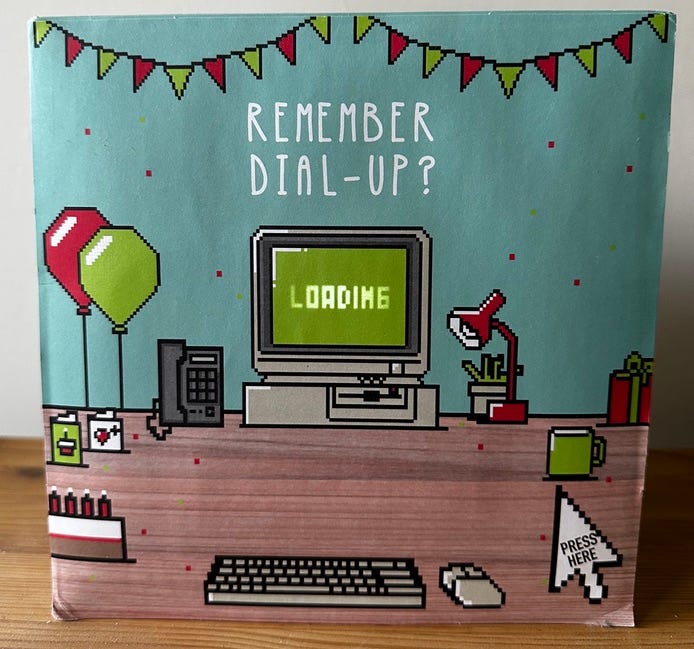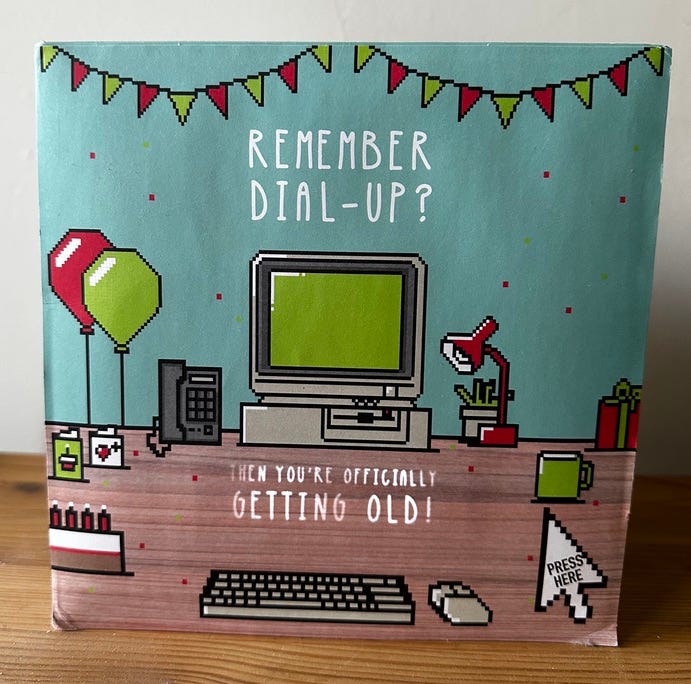Officially getting old
In this episode, we explore how some kinds of change only become visible over longer periods of time
A couple of years back, a former business-partner sent me an ‘interactive’ birthday-card, with the words ‘REMEMBER DIAL-UP?’ printed at the top:
Remember dial-up? Oh yeah, sure, I remember that, all right…
But anyway, down at the lower right of the card, there’s a white arrow with the text 'PRESS HERE’. I press the button. The green screen lights up with the word ‘LOADING’ fading in and out, with a tiny red dot flickering just below and to the right, as a sequence of sounds plays through a speaker hidden inside the card - a sound I could best summarise as:
clik-clak-clok da-do-dee-do-da-do-do ndeee-deee-deee kssssss PKAAA!-PKEHH!-pkeeeh! hsssssssssssssss…
Oh ye gods, that sound? Years of my life, that was…
So perhaps no great surprise that after playing that sound, the card lights up below the computer with this message:
‘Officially getting old!’ Okay, yeah, I suppose I am: I mean, it was more than forty years ago, after all…
My business-partner and I were running a typesetting-business at the time. It was one of the first in the country to connect microcomputers to a typesetting machine, so that people could publish their own material without going through a publisher or the like, and at much lower cost, too. Unlike just about anyone else back then, we could do it direct from a word-processor, bypassing all of the complicated typesetting-codes by using the word-processor’s own formatting - and copyfitting it all to the right size and font, too, which was pretty much unique anywhere in the world at the time, for microcomputers, at least. And yeah, I wrote all of the software to make that happen: a lot of all-nighters to get it done in time... It was ground-breaking, in its own way - so much so that we even had the BBC come to visit us at one point, to film a segment for their Making The Most Of The Micro series. Interesting times.
(The segment runs from 0:00 to 3:37 in the series-Episode 3, ‘Strings and Things’, as republished up on YouTube. That’s our office, starting at 1:02 in the video; and yeah, starting at 1:09, that’s what I looked and sounded like back in those days. Ouch…!)
But dial-up? - ugh, yeah: bane of my life, that was. In those pre-internet days, it was the only way to send text in real-time, down the phone-line. You dialled up a number, pushed the phone-handset into a kind of rubber-bung thing, and then that sound would play, making the connection, with the hssssssss being the data coming down the line, loading into our bulletin-board system on one of the twenty or so computers crowded in our shop-front office. ‘300 baud’ was the connection-speed, at first; about thirty characters or five words a second; less than a page of text in a minute, and several hours to send a whole book. Yes, text-only, of course: don’t even think of trying to send images without a dedicated high-speed line, which was way outside of almost anyone’s budget. And the whole thing was finicky as hell: if there was the slightest hiccup anywhere, you had to start all over again. Later on, the speed did get better, upgraded to 1200 baud, or 1200 bits per second, four times faster, and quite a bit more reliable, too: that was bearable, but only just - and a lot of our customers couldn’t afford to upgrade anyway. Not a fun part of the job.
Eight years of that, and that part of it didn’t get much better in all of time. Officially getting old, all right: I aged fast in that period of my life…
One of the few advantages of getting old is that we’ve seen large-scale change over much longer timescales than our younger counterparts have done. So yeah, a few examples come to mind straight away. When I was a kid, growing up in semi-rural England, there were still plenty of horse-drawn vehicles around; almost-lost skills now, such as Mr Kettley at the forge down the road fitting a red-hot steel tire to a wooden cartwheel. Going down to the shops in the village every day because there was no refrigerator - in fact so much of a rarity back then that when my parents needed one to store vaccines in the surgery, they had to pay a huge additional luxury-goods tax on top of its already terrifyingly-high list-price.
Social changes, too. Each year the kids from the local agricultural college would roll a old waggon full of students into the towering blaze on the village green on Bonfire Night (yeah, they really did - along with throwing firecrackers or ‘jumping-jacks’ at random into the crowd); but ten years later, none of them wanted to learn farming at all, but instead to become ‘agronomists’ to make lots of money telling other farmers that they were doing it all wrong. I was lucky enough not to live through a war first-hand, though my mother did; yet whilst even up until my teens there were plenty of wrecked houses and bomb-craters still to be seen in the local town and in London, the office-block developers in the late 1960s and early ’70s wrought more more damage to the City than the Luftwaffe ever did.
Technology-changes aplenty too, of course. Back in the 1950s, a bicycle sputtering past with a tiny, noisy petrol-engine built into the back wheel; these days we do the same thing instead with a near-silent, near-invisible battery-motor hidden in the wheel-hub. The dentist’s drill back then was driven by a metal-coil spring belt; at least that one was powered by an electric motor, because the previous one, still languishing in the corner of the waiting-room, was driven by a pedal, like that on a spinning-wheel. As a school-child I loved to stand on the bridge to watch the steam-engines pass by on the main-line below; but those had all vanished from the scene even before I left primary-school. I remember being fascinated by electronic calculators when they first came onto the market in the mid-1970s; and I remember too that my first microcomputer, that I bought almost half a century ago now, had just 256 bytes of of memory. Not 256 kilobytes, which was still a luxury a decade later; not 256 megabytes, the size of my first portable hard-drive in the 1990s; not 256 gigabytes, as in the phone in my pocket right now; but just plain 256 bytes - and yet even that was space enough back then in which to write a useful and usable program.
Other changes that I haven’t seen even in my lifetime, but still all too much within living memory for others. Universal-healthcare was already recently in place by the time I grew up, so I’ve never experienced the full horrors of privatised non-care - though I’m getting some hints of it now in a country that has foolishly allowed privatisation to creep back in, inflicting unnecessary costs of every kind on everyone all over again. And unlike my mother, I never saw an entire street-full of pre-school children wiped in a single day by diphtheria; vaccines at last put an end to that, though polio was still around in my time - a couple of kids at school crippled by that, whilst a friend’s older brother never got to school at all, spending the rest of his not-very-long life stuck inside an ‘iron lung’. Some people now, they seem to think that vaccines are somehow a bad thing - but they’ve never lived in a world without them…
Much the same applies with change in the business-world. I’ve been around long enough now to see the same patterns and ‘solutions’ repeated again and again, just in somewhat different form each time. For example, cloud-computing now is still thought of as shiny and new and special and unique, but it’s basically just a somewhat fancier and faster variant of what we used to call ‘time-share’ half a century ago: in both cases, it’s still just ‘someone else’s computer’. And for IT generally, the argument for centralised-systems versus decentralised-systems has wobbled back and forth decade by decade for almost a whole century by now. To use the old French phrase, plus ça change, plus c’est la même chose: the more it changes, the more it stays the same…
And the same, of course, in the world of politics. Exactly the same mistaken policies and overly-simplistic ‘solutions’ repeated time after time, and each time those politicians duly discover, to their supposed amazement, that those policies not only don’t work, but actually can’t work, and never could. Likewise, exactly the same failed scams, dysfunctional delusions, and often outright frauds such as re-privatisations and ‘trickle-down economics’, repeatedly foisted on each new generation of voters, with exactly the same disastrous results every time. Without any apparent awareness of history, nor any apparent means to learn over longer periods of time, the otherwise all-too-predictable failings and disasters are, again, each time made out to be unexpected, impossible to know in advance - though maybe, as the more experienced yet more cynical of us might somewhat suspect, they were always intended to fail in the first place, in order to pass on the blame and costs onto someone else. Sigh…
So yes, those of us who remember dial-up and the like may well be officially getting old by now: but we do also have a longer-term view of the world, and a longer-term experience of how real changes do and don’t work in that world. And that may turn out to be very useful indeed as we all head onward into the much, much larger changes that are coming our way right now.





